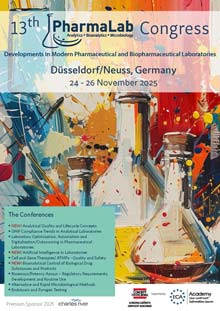THE SPECIFIC CHALLENGES FOR THE IMP QP
The IMP Working Group is a well-established sub-organisation of the European Qualified Person Association. Its Pre-Conference workshop has become a familiar part of the annual Qualified Person Forum. Designed by IMP QPs for QPs it is mainly structured around feedback from the IMP QP community and hence tailored specifically to their needs. It also serves as the annual group meeting and provides a very good opportunity for networking.
At last year's Forum the one day pre-conference "IMP QP in Modern Times - II" picked up the thread and continued the theme started at the Lisbon QP Forum the year before. It attracted more than 60 delegates from 35 pharmaceutical companies, representatives from authorities and universities.The day started with the highly topical "key inspection issues for IMPs versus regular manufacture - what do we have to concentrate on ?" Maria Wängelin in her role as a GDP/GMP Inspector at the Swedish Medical Products Agency guided through the most recent inspection findings. As is so often the case, it is the simple things that are overlooked. Since IMPs may be produced in noncommercial manufacturing areas, special attention has to be paid to the potential for cross-contamination and mixup issues, especially for the production of blinded products.

Recommendation
Hamburg, Germany10 March 2026
Pre-course Session: “Investigational Medicinal Products (IMP) QP Education Course”
In the following Sue Mann (Sue Mann Consultancy, UK) presented a "risk based approach for ascertaining the appropriate GMP for excipient (and IMP) supplier qualification including the "1 year on" experience". This tool evaluates the impact of the starting materials - and has even been used for comparators - on quality, safety and efficacy. It also includes the weighting dependent on the final use of IMP (sterile products, non-sterile liquids or non-sterile oral solids). A further ranking was included to reflect the various development stages, e.g. small scale phase I studies vs. large scale phase III - multi-centre studies. A specific biotech add-on is also available.
Working on novel Nanoparticles with covalent and noncovalently bound pharmaceutical entities in the endocrinology and oncology area - Justin Barry from Midatech Pharma España, Spain illustrated how to adopt the evasive (weasel) words "to the appropriate level / fit for purpose / as necessary / where applicable" in the critical areas of the IMP QP's daily work using a small, but highly effective team approach.
The "recent developments in legislation impacting IMP QPs" were provided by Dr Susanne Ding (Boehringer Ingelheim, Germany) in the first afternoon session. Dagmar Chase, representing the European CRO Federation (EUCROF), gave an overview of the new "Clinical Trial Regulation (EU No 536/2014)". It will repeal the current Clinical Trial Directive as soon as the EU portal for the streamlined application procedure is in place - both systems will run in parallel for three years after the CT Regulation comes into effect. The IMP QP Working Group had an intense discussion on the new requirements for labelling the "period of use" even on small immediate packaging as well as on IRT systems no longer being allowed to manage the period of use of IMPs. Both are laid down in Annex VI of the CT Regulation. These changes are expected to have a significant impact on the future conduct of clinical trials in Europe. Thus numerous discussions are underway. Industry is trying to better understand the reason for this requirement, but is also in contact with authorities and evaluates options to have Annex VI revised again. The EQPA's IMP Working Group is fully supporting EFPIA's position paper in this regard.

Recommendation
Wiesbaden, Germany24/25 March 2026
Trends in Barrier Systems & Robotics
An electronic approach to the "Product Specification File" was presented by Niina Taylor from Pfizer, UK. Acting as an IMP QP in a global company, access to all necessary information at the specific time of batch certification remains a significant challenge. As a consequence of this an electronic documentation management system was developed to pull together the documents required per Annex 13 from various other systems, e.g. inventory, Q systems (investigations, deviations, change controls), LIMS, regulatory information.
A summary of the discussions during the pre-conference is available as Q & A document on the EQPA website in the IMP Working Group download area.
Author:
Dr Susanne Ding
... is a QP for Investigational Medicinal Products (IMPs) at Boehringer Ingelheim, Germany. She also heads the IMP QP Working Group within the European QP Association.



